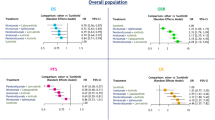Abstract
Background
Angiogenesis is regulated by a balance of both angiogenic inducers and inhibitors. This study was designed to evaluate the effect of both maximum-tolerated doses (MTD) and low-dose metronomic chemotherapy (LDM) on serum vascular endothelial growth factor (VEGF), thrombospondin-1 (TSP1) and VEGFR1 concentrations in patients with advanced nonsmall cell lung cancer.
Patients and methods
Forty consecutive patients with advanced stage nonsmall cell lung cancer were included in this prospective study. Twenty patients received MTD chemotherapy including 75 mg/m2 of cisplatin and 75 mg/m2 of docetaxel on day 1. The LDM treatment consisted of cisplatin 25 mg/m2 and docetaxel 25 mg/m2 were given to other 20 patients on weeks 1, 2 and 3. Serum levels were prospectively measured in serum by ELISA at four times; before chemotherapy and at 1, 2 and 3 weeks following initiation of chemotherapy.
Results
The major finding in this study that MTD chemotherapy but not LDM chemotherapy resulted in significant changes in VEGFR1 and TSP1 serum levels. Due to the effect of LDM chemotherapy, we showed no statistically significant change in patients for all serum VEGF, TSP1 and VEGFR1 levels. Similarly, serum VEGF levels did not also change under MTD chemotherapy. The MTD chemotherapy induced significant and long-lasting increase of TSP1 levels and decrease of VEGFR1 levels that persisted for at least 3 weeks after the chemotherapy initiation. No significant correlations were found between serum VEGF and TSP1 levels in cancer patients treated with both LDM and MTD chemotherapy. The circulating angiogenic balance (TSP1/VEGF) is decreased in cancer patients (P = 0.039).
Conclusions
The continuous/metronomic chemotherapy may not achieve a more pronounced antiangiogenic effect than MTD-scheduling chemotherapy. Future studies involving a larger number of patients are needed to confirm the present findings.
Similar content being viewed by others
References
Kerbel RS, Kamen BA (2004) The anti-angiogenic basis of metronomic chemotherapy. Nat Cancer Rev 4:423–436
Stempak D, Seely D, Baruhel S (2006) Metronomic dosing of chemotherapy: applications in pediatric oncology. Cancer Invest 24:432–443
Browder T, Butterfield CE, Kraling BM, Shi B, Marshall B, O’Reilly MS, Folkman J (2000) Antiangiogenic scheduling of chemotherapy improves efficacy against experimental drug-resistant cancer. Cancer Res 60:1878–1886
Hanahan D, Bergers G, Bergsland E (2000) Less is more, regularly: metronomic dosing of cytotoxic drugs can target tumor angiogenesis in mice. J Clin Invest 105:1045–1047
Folkman J (2007) Angiogenesis: an organizing principle for drug discovery? Nat Rev Drug Discov 6:273–286
St Croix B, Rago C, Velculescu V, Traverso G, Romans KE, Montgomery E, Lal A, Riggins GJ, Lengauer C, Vogelstein B, Kinzler KW (2000) Genes expressed in human tumor endothelium. Science 289:1197–1202
Dudek AZ, Mahaseth H (2005) Circulating angiogenic cytokines in patients with advanced non-small cell lung cancer: correlation with treatment response and survival. Cancer Invest 23:193–200
Takigawa N, Segawa Y, Fujimoto N, Hotta K, Eguchi K (1998) Elevated vascular endothelial growth factor levels in sera of patients with lung cancer. Anticancer Res 18:1251–1254
Brattstrom D, Bergqvist M, Larsson A, Holmertz J, Hesselius P, Rosenberg L, Brodin O, Waqenius G (1998) Basic fibroblast growth factor and vascular endothelial growth factor in sera from non-small cell lung cancer patients. Anticancer Res 18:1123–1127
Tas F, Duranyildiz D, Oguz H, Camlica H, Yasasever V, Topuz E (2006) Serum vascular endothelial growth factor (VEGF) and Bcl-2 levels in advanced stage non-small cell lung cancer. Cancer Invest 24:576–580
Tuszynski GP, Smith M, Rothman VL, Capuzzi DM, Joseph RR, Katz J, Besa EC, Treat J, Switalska HI (1992) Thrombospondin levels in patients with malignancy. Thromb Haemost 67:607–611
Gonzalez FJ, Rueda A, Sevilla I, Alonso L, Villareal V, Torres E, Alba E (2004) Shift in the balance between circulating thrombospondin-1 and vascular endothelial growth factor in cancer patients: relationship to platelet α-granule content and primary activation. Int J Biol Markers 19:221–228
Damber JE, Vallbo C, Albertsson P, Lennernas B, Norrby K (2006) The anti-tumour effect of low-dose continuous chemotherapy may partly be madiated by thrombospondin. Cancer Chemother Pharmacol 58:354–360
Bocci G, Francia G, Man S, Lawler J, Kerbel RS (2003) Thrombospondin 1, a mediator of the antiangiogenic effects of low-dose metronomic chemotherapy. Proc Natl Acad Sci USA 100:12917–12922
Hamano Y, Sugimoto H, Soubasakos MA, Kieran M, Olsen BR, Lawler J, Sudhakar A, Kalluri R (2004) Thrombospondin 1 associated with tumor microenvironment contributes to low dose cyclophosphamide-mediated endothelial cell apoptosis and tumor growth suppression. Cancer Res 64:1570–1574
Author information
Authors and Affiliations
Corresponding author
Rights and permissions
About this article
Cite this article
Tas, F., Duranyildiz, D., Soydinc, H.O. et al. Effect of maximum-tolerated doses and low-dose metronomic chemotherapy on serum vascular endothelial growth factor and thrombospondin-1 levels in patients with advanced nonsmall cell lung cancer. Cancer Chemother Pharmacol 61, 721–725 (2008). https://doi.org/10.1007/s00280-007-0526-4
Received:
Accepted:
Published:
Issue Date:
DOI: https://doi.org/10.1007/s00280-007-0526-4




